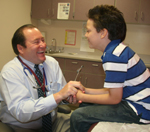|
Bernard L. Maria, M.D., a founding director of the Charles P. Darby
Children’s Research Institute (DCRI) at MUSC, has been named chair of
the Department of Pediatrics and Ellington Charles Hawes Chair in
Pediatrics at the Medical College of Georgia (MCG) School of Medicine.
Maria, an internationally-known physician-scientist, will join the MCG
faculty July 1.
 Dr. Bernie Maria shares a laugh with Jackson Marx, a patient he has cared for since infancy. Dr. Bernie Maria shares a laugh with Jackson Marx, a patient he has cared for since infancy.
Maria
also will serve as medical director of the MCG Health Children’s
Medical Center, pending approval of the MCG Health, Inc. Board of
Directors at its May meeting. It is at the helm of the MCG pediatrics
department and the 154-bed pediatric hospital that he plans to wield
innovation and collaboration in making translational research, or the
move of new discoveries from the lab bench to the patient’s beside, a
larger priority in Georgia.
“The Medical College of Georgia has made a wise choice in selecting Dr.
Maria to head their Pediatrics department,” said MUSC President Ray
Greenberg, M.D., Ph.D. “He will bring to them a wealth of experience
and we hope to partner with him in developing regional strategies for
meeting the health care needs of children in the Southeast.”
Based on the wealth of knowledge and experience gained at the DCRI, and
his breadth of clinical and research practice as a pediatric
neurologist and neuro-oncologist, Maria plans to strengthen MCG with
strategic new recruitments, by growing graduate educational programs,
enhancing research productivity, and boosting pediatric services to the
Georgia community. An additional benefit will come from Maria’s
master’s degree in business administration, a rarity among physician
leaders. Having an in-depth understanding of how the business of a
hospital must operate will undoubtedly benefit the system in the long
run.
“This is how I define a great institution: it’s when you can leave the
institution, without the institution leaving you. The values,
collaborations and collegial spirit stay with you. MUSC is one such
great institution,” Maria said. “If what we accomplished with the
founding and record growth of the DCRI hadn’t been so meaningful, I
wouldn’t be in the position to take this amazing opportunity. I am
thankful and grateful to all those at MUSC who played a part in showing
me what’s possible.”
For the last six years as executive director of DCRI, Maria helped grow
research funding from $9 million to more than $27 million annually. The
research institute, one of 15 facilities in the country dedicated to
children’s health, houses 150 laboratories, 11 research programs, and
approximately 150 investigators and staff studying pediatric problems
such as cancer, blood disorders, congenital heart disease and genetic
disorders. Additionally, he has served as associate director of MUSC’s
Neuroscience Institute, which ranked third in the nation in National
Institutes of Health research funding in 2008.
As he looks to the future, Maria sees strong research collaborations
between MCG and MUSC, as well as serving as a catalyst for stronger
intercollegiate opportunities between the two schools. His calling, as
he puts it, is to continue to elevate the point of view that children
should be more than trickle-down recipients of research; that listening
to the health care needs of children at the bench and bedside holds the
key to elevating the status of children’s health in the Southeast and
beyond. For example, Maria and colleague Bryan Toole, Ph.D., Cell
Biology and Anatomy professor, will structure both of their labs in
order to operate a program together, across state lines, to move child
therapies forward. Maria hopes to foster similar relationships with
other MUSC and MCG faculty.
“Dr. Maria has provided strong and insightful leadership in fostering
interdisciplinary collaborations focused on childhood and adolescent
diseases and developmental biology. Under his leadership, the DCRI
built a model that encourages faculty, staff and students from many
departments on campus to work together in common space, thus building
synergism across disciplines,” said MUSC Provost John Raymond, M.D. “By
assuming the chairmanship of the Department of Pediatrics at the
Medical College of Georgia, he will be in an ideal position to build
bridges across the Georgia-South Carolina border, and to develop
meaningful regional collaborations to address diseases of infancy,
childhood and adolescence.”
Maria’s research focuses on how to kill tumor cells, including those in
brain tumors, by using a novel, patented compound, hyaluronan
oligomers. His clinical expertise is in caring for children with brain
tumors, a leading cause of death from disease in children, as well as
other neurological problems.
“This really is an honor for this distinguished group of people to say,
‘He’s our guy,’” Maria said. “At MUSC, I learned the culture of basic
science firsthand, and I think that is what is going to make a
difference in bringing discoveries into clinics. MUSC gave me the
opportunity to interact with people from a large number of fields, who
hold different sets of values and it sensitized me to what the barriers
are to translating discoveries into treatments. I’ve gained a great
deal of respect for the process and realized that science and practice
are really one.”
Friday, May 8, 2009
|



